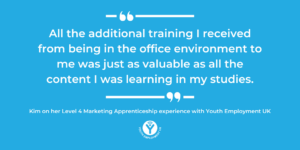Advertising Account Executive careers guide and job profile
Advertising matters in a world where so many brands must compete to capture the public’s attention. Use your creative skills to shout your message as an Advertising Account Executive.
Getting into Advertising Account Executive careers
How much money can you earn as an Advertising Account Executive?
These LMI Job Trends give you a sneak peek of how much you could earn starting out for this career, and how much your salary could grow with experience.
Average salary for marketing jobs
Recent labour market information says you can earn on average between £16,000 and £50,000 a year as an Advertising Account Executive in the UK.
Your starting salary can vary because of factors like level of experience, training, location or the size of the company. Your salary as an Advertising Account Executive will increase over time as you build skills, knowledge, and experience.
Sales, Marketing & Procurement Career FAQs & Insights

Is there something you’d like to know about Sales, Marketing & Procurement careers?
Skills you need to become an Advertising Account Executive
Useful skills to put in your CV:
- Creative and energetic with bags of enthusiasm and motivation
- Good business sense and being able to carry out work to meet the costs of an agreed budget
- Good negotiating skills for working with clients
Top Skills-boosting Tip
Get into Lifelong Learning.
Continuing to build and perfect your skills throughout your career, and learn new ones too.
Find out how in the Lifelong Learning hub by clicking the button below.
- Strong communication skills, both written and spoken
- Good presentation skills – you can present ideas to clients in a convincing way so that they can share your passion and vision for a project
How Do You Get These Skills?
Vocational qualifications and work experience will help you build these skills over time.

Build Your Skills With the FREE Young Professional Programme
What Qualifications & Training Do You Need For Marketing Careers?
School, College and Training
You might find it useful to do a Foundation Certificate in Professional Marketing.
You could take the advertising Foundation Certificate to get some of the skills you need to get a paid job in advertising. The course is offered by by the Institute of Practitioners in Advertising and is open to anyone with less than one year of experience in an advertising, marketing or communications role.
BTECs
As an alternative to A-Levels, you can do BTECs from the age of 16. There are a number of BTEC subjects you might want to consider if you are interested in becoming an Advertising Account Executive. Courses available could include:
- BTEC Level 3 National Extended Certificate in Marketing
- BTEC Level 5 Higher National Diploma in Business (Marketing)
Courses available can vary across schools, colleges and sixth forms and across training providers.
You’ll normally need 2 or more GCSEs at grades 9-3 (A*-D) or equivalent for a Level 2 or 3 course. If your qualifications are lower than this, you’ll most likely start on a Level 1 course.
University degrees and graduates
You can get into advertising with a degree in any subject.
Some employers may prefer it if you have a degree in a subject like:
- advertising and marketing
- statistics or operational research
- communication and media studies
- business or management
- psychology
Your university careers service can help you find work experience, internship and placement opportunities.
UCAS has more information on degree courses and entry requirements.
Apprenticeships
An apprenticeship is a scheme where you train while earning a starting salary. With an apprenticeship (or advanced apprenticeship) you’ll have a paid job with an employer that includes structured training and learning. This training leads to an official qualification that’s recognised by employers as an industry standard.
You may be able to get into this job by doing an advertising and media executive advanced apprenticeship.
Anyone over 16 can study for an apprenticeship. You will normally need at least 5 GCSEs at grades 4-9 (A*-C) to study for an apprenticeship, including English and Maths.
A-Levels
A Levels are academic qualifications that come after GCSEs. A Levels can be an ideal stepping stone to an advanced apprenticeship, a degree, a job, or going straight into a freelance career.
Any A Levels relating to Business, English, or Media and Journalism will be useful.
You’ll normally need GCSEs at grade 4 (C) or above in English and Maths. 2 to 3 relevant A levels, or equivalent, are usually required to complete a degree.
T-Levels
T-Levels are a choice for learners after GCSEs alongside apprenticeships and A-levels.
T Levels, an alternative to A-Levels, are qualifications in vocational, technical and hands-on subjects that you can choose to do after GCSEs instead of traditional academic qualifications.
They include a mixture of classroom-based learning and industry placements where you can put your new skills into practice in real-world scenarios.
A T Level in Digital Production, Design and Development could be a good choice for an aspiring Advertising Account Executive.
You may need 4 or 5 GCSEs at grades 9 to 4 (A* to C), or equivalent, including English and maths for T Levels.
Career Progression
Where your career could take you…
What Work Experience Do You Need For Marketing Jobs?
Work Experience Tips
It can help you decide if this is the right career for you if you have previously done work experience in marketing. Work experience in a marketing environment can help you build useful skills.
Examples of relevant work experience include:
- Work shadowing (even if it’s just for a day)
- Work placements in a company
- Work experience placements on a college or university course
Volunteering Tips
You could get volunteering experience by:
- volunteer to promote local charities
- write for student magazines, newspapers, blogs or social media
- work on student or volunteer radio services
Creating your own blog or setting up a strong social media presence can show employers you have an understanding of what’s involved in building brand reach and getting people interested in the content you share.
What Does An Advertising Account Executive Do?
Some example daily responsibilities include:
- Researching what a client sells, what their goals are, and who their competitors and target markets are
- Meeting and calling clients for briefings, and to discuss strategy and report on a campaign’s success
- Working as part of a team to plan the most effective advertising solutions for a client
- Helping to pitch new contracts to potential clients, and presenting proposals for their approval
- Planning and organising work to make sure projects are completed on time and in budget.
You could be working in-house for one organisation to promote their business, or you could work for an agency and take part in building marketing campaigns for multiple clients.
Maybe you have one business to promote, or maybe you have lots.
Either way, you have to really understand what kind of audience they want to reach and how your messaging can increase sales of their product or service.
How To Find Advertising Account Executive Jobs: Next Steps
To find jobs for young people in this role, search on jobs boards for early career roles and opportunities with keywords such as:
- Junior advertising account executive
- Graduate advertising account executive
- Account manager apprenticeship
- Trainee advertising account executive
You can take a look at our database of local opportunities to see if there are any relevant jobs, work placements, or careers events and workshops to help you get started. Create Your Future!
Get Into Marketing Careers With Youth-Friendly Employers
These employers and organisations are here to help. They care about your potential and desire to learn, not just your qualifications and experience. They may be able to offer traineeships, apprenticeships, graduate schemes, first jobs, careers advice, wellbeing support and much more.
Sales, Marketing & Buying Career Tips & Opportunities
Sales, Procurement & Marketing Career Guides
View job descriptions with average UK salary, useful qualifications and a variety of routes into this career.
See All Our Youth-Friendly Employers

























YES! I Want More Free Careers Help...
So what are you waiting for? Grab your future.



































